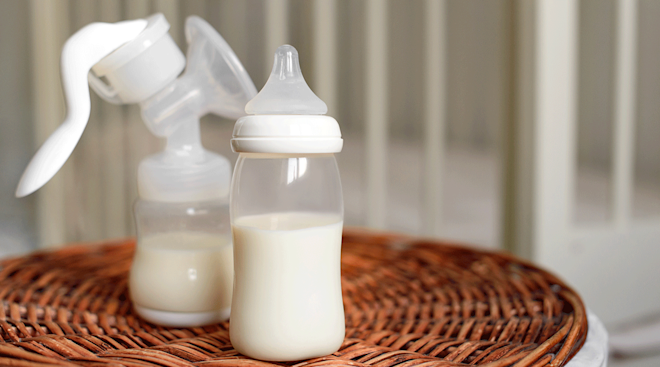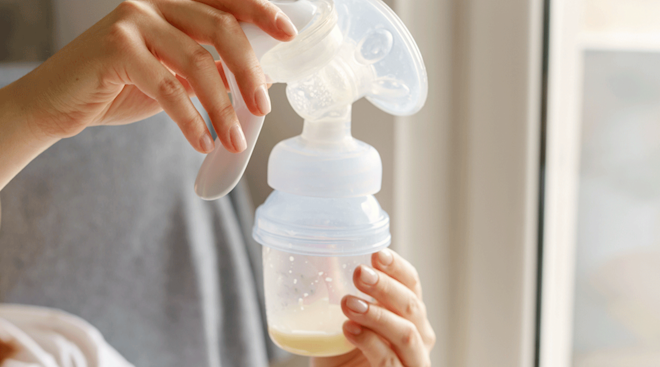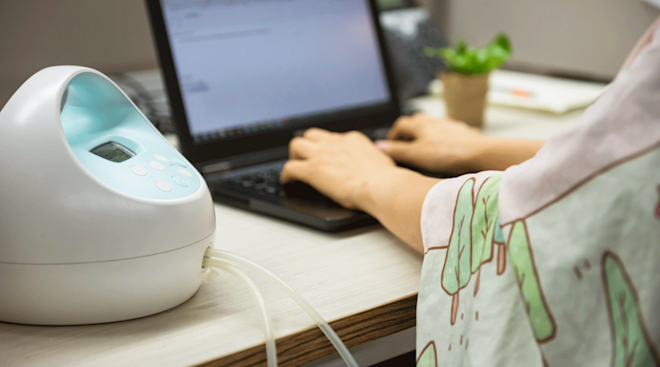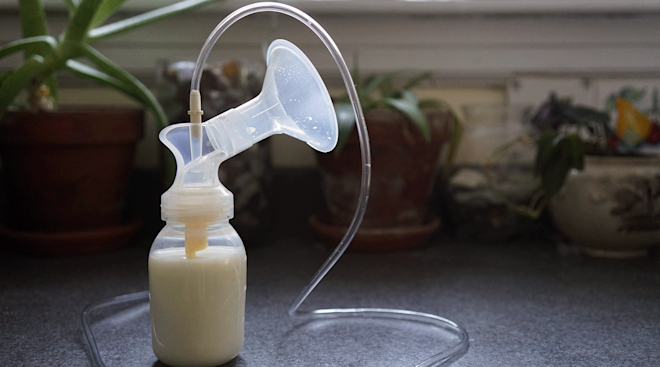8 Ways Breastfeeding Can Affect Your Sex Life and What to Do About It
Here’s the deal: It’s totally normal for your sex life to take a hit after you’ve had a baby. For the most part, new moms anticipate this (at least a little). There’s the recovery from birth, the exhaustion and the hormonal loopty-loops. But if you’re breastfeeding, there may be other intimacy obstacles you weren’t quite expecting. The good news? Breastfeeding and sex are not mutually exclusive. You can do both—you just might have to change things up a bit and adjust expectations. Here, a few common ways breastfeeding can affect your sex life, and how to handle it.
If you feel like you have no sex drive after baby, you are not alone. “It’s very common,” says Heather Bartos, MD, an ob-gyn based in Cross Roads, Texas. “Many women’s sex drives change not only after baby, but while breastfeeding too—and for a multitude of reasons.” One of the most basic reasons: Hormone fluctuations. During pregnancy and breastfeeding, the hormone prolactin cranks in order to stimulate your breasts to produce milk. But high prolactin levels push down estrogen levels, which in turn dampens sexual desire. “Plus, levels of testosterone are also lower in breastfeeding women,” Bartos says. While it’s thought of as a “male" hormone, it’s actually quite important when it comes to female desire.
Solutions
You can’t really alter your hormone levels, but know this: “Generally, as baby eats more and more solid food—starting at around 4 to 6 months—and the breastfeeding/food ratio changes, your hormones will slowly get back to normal, and so will your sex drive,” Bartos says. In the meantime, it’s a good idea to articulate to your partner the science of what’s going on. “It’s really a great opportunity to have an open and genuine conversation about how you want to move forward in your sexual relationship with these new factors to consider,” says Kimberly Ann Johnson, a birth doula, a sexological bodyworker and author of The Fourth Trimester: A Postpartum Guide to Healing Your Body, Balancing Your Emotions, and Restoring Your Vitality.
Nipples are usually sore in the early days of nursing as your breasts and baby navigate their new relationship. But you’re usually not having intercourse at this stage of the game, since your body is still recuperating from birth. “By the time you get the all-clear for sex, at about six weeks, there should be no pain from breastfeeding,” Bartos says. “If your nipples are sore or raw at this time, consult a lactation specialist to ensure feeding is going correctly.”
On the other hand, leaky breasts during intimacy is totally expected—and likely occurring because good things are happening. “Either your breasts are being stimulated, they’re full of milk for baby to drink or you’re having an orgasm,” Bartos says. Milk letdown and the contractions felt during orgasm are both triggered by the same hormone: oxytocin.
Solutions
“There’s nothing wrong with lactating during sex. In fact, some partners find it sexy,” Bartos says. But if you really want to avoid the situation, you can pump or nurse baby to empty your breasts before getting intimate with your partner. Another solution is to wear a bra with nursing pads during sex.
Changing your sexual positions may help too. A nursing mom’s full breasts can make some sexual positions less than comfortable, like being on all fours. “Here, your breasts often pendulate, making them feel heavy and sore,” Johnson says. “Plus, that movement may also stimulate milk letdown.” Lying on your back in the missionary position is likely the easiest on your breasts in terms of gravity. “It lessens the possibility for heavy letdown all at once,” says Johnson, adding that having your partner behind you while lying on your side—and even having them wrap their hands around you to firmly hold your breasts—is also comfortable for many.
All pregnant women contend with physical changes. Tummies and breasts grow in size and shape. Stretch marks may appear. Heck, even feet can get bigger and flatter. For breastfeeding moms, your breast continue to change after birth too. After going through so much transformation, some women may initially struggle to feel sexy. “As our body changes, we can often fall into the trap of fearing the changes are permanent,” Johnson says. “And the truth is, some are and some aren’t. Your breasts probably won’t go back to being exactly how they were. But your breasts and nipples also won’t stay as elastic and pliable forever.”
Solutions
Give yourself time to heal and adjust—and try viewing your body with awe. “Think about all your body has been through and how it’s serving you and your child,” Johnson says. “You can channel that same awe to make sexual connection new and alive and rich.”
There are many new moms out there Googling “vaginal dryness breastfeeding,” and for good reason. Remember how nursing elevates prolactin levels and lowers estrogen levels? “When there’s a decrease in estrogen, there’s a decrease in blood flow and natural lubrication to the genitals,” says nurse and lactation consultant Amey Fields, RN, IBCLC, owner of AZ Breastfed Babies in Goodyear, Arizona. “Because of this, breastfeeding moms can expect some vaginal dryness and increased vaginal tenderness.” It’s also why more breastfeeding moms than formula-feeding moms report painful postpartum intercourse, according to a report published in The Obstetrician & Gynaecologist.
Solutions
To help, use a quality water-based lubricant. “These are smooth and slick and will lessen the risk of irritation and bacterial or yeast infections,” says Fields, who suggests avoiding any lube with glycerin, parables and fragrances that may up the irritation. It’s also a good idea to drink lots of water, since dehydration can cause the skin around the vagina to become dry. “The amount of fluid that each person needs to stay hydrated varies,” Fields says. “I recommend simply looking at your urine in the toilet: If it’s not pale yellow, drink more water.”
Being bleary-eyed and sleep-deprived is practically the normal state of being for any new parent. “Even if you have a newborn who’s sleeping ‘well,’ you’ll still be waking up every two to three hours to breastfeed,” Fields says. “And that takes a lot out of you.” Lack of sleep does more than make a new mom groggy and irritated, and therefore feeling decidedly not sexy. “It can also increase cortisol levels—aka your stress hormones—which further diminishes libido,” Bartos says.
Solutions
The best advice is to get more sleep—but if it were that simple, we’d all be doing it already. So yes, try to give yourself a break and rest as much as you can (leave the dishes and unanswered emails and take a snooze), but also take an alternate look at intimacy. “We tend to think of pleasure as something extra that can only occur when all of our other needs are met,” Johnson says— as in, “once I’m well rested, I’ll have energy for sex.” But perhaps a better way to view intimacy during this time of great change is: What kind of energy can sex offer me? “Do you want to be held? Cradled? Do you need to be relieved of reciprocity?” Johnson asks. Whatever it is, figure out what sexual intimacy can give to you, not demand of you.
The hormones involved in menstruation are suppressed when you’re nursing. (This is called lactational amenorrhea.) “Your lack of a period, however, doesn’t mean you’re not ovulating. It’s still possible to get pregnant without ever having a period,” Fields says. The thing is, there’s no specific timeline for when your cycle will return. It could be six months, It could be two years. And it’s precisely that unpredictability that can kill the mood. “Women are terrified they’ll become pregnant again,” Johnson says.
Solutions
“While it’s possible to continue to track your fertility cycles at this time, many new moms aren’t willing to take any risk based on the uncertainty, which makes them avoid sex,” Johnson says. A better idea: Talk with your midwife or OB to learn about what birth control options are best for you.
Newborns can eat 10 to 12 times in 24 hours. That’s a lot of skin-to-skin time with your new baby. While it’s wonderful, “it can lead to feelings of being ‘touched out’,” Fields says. Clearly, the touch of an infant and the touch of a partner are very different, but they both can make a new mom feel as though her body isn’t her own. “But ultimately they are your breasts, and you get to decide who touches them and who nurses from them,” Johnson says.
Solutions
To help gain back that feeling of ownership, identify the kind of touch and intimacy you do want to receive from your partner, and then go ahead and ask for it. “If you can find ways of viewing sexual contact as something you receive, something that nourishes you, there won’t be such a huge leap to take,” Johnson says. Once you start to feel less depleted—like you’re always giving—you’re going to view intimacy in a more positive way.
Hearing baby cry while you’re sharing an intimate moment with your partner can definitely be a buzzkill. But for many, simply anticipating that cry can dampen desire. “The constant readiness of nursing moms means your nervous system is always on call, producing stress hormones,” Johnson says. “The more stress hormones you produce, the less sex hormones you produce.”
Solutions
It’s not really possible for nursing moms to 100 percent switch off that always-ready instinct, but you can work with your partner to share more responsibilities—and to prioritize your own recharge time, sans baby. Anything that can calm and soothe your nervous system is a good thing, Johnson says. “But also, be patient with yourself. As new moms, it takes longer to switch gears from daily activities into a self that feels more sexual. The more we can stay connected to the little pleasures through the day, the less of a huge gap it will seem to jump into the sexual.”
Published March 2019
Please note: The Bump and the materials and information it contains are not intended to, and do not constitute, medical or other health advice or diagnosis and should not be used as such. You should always consult with a qualified physician or health professional about your specific circumstances.
Plus, more from The Bump:
Navigate forward to interact with the calendar and select a date. Press the question mark key to get the keyboard shortcuts for changing dates.




















































